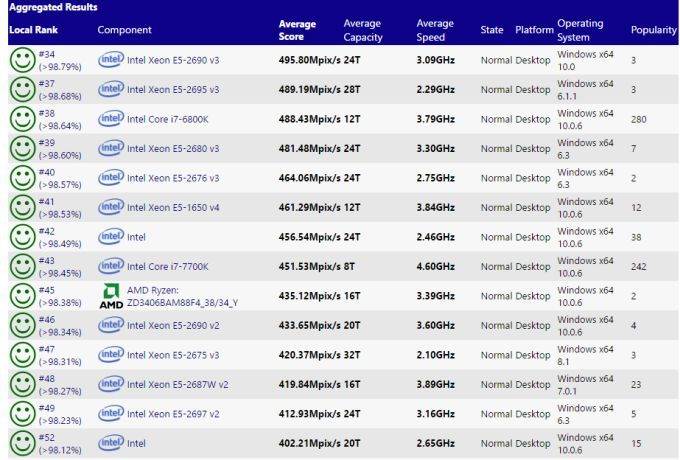AMD’s first Ryzen chips for desktop computers are expected to launch March 2nd, and AMD claims they’ll offer a huge performance boost over anything the company has offered to date.
In fact, AMD promises its top-of-the-line Ryzen chips will be competitive with Intel’s top chips, while selling for half the price, or possibly even less.
For the most part we’ll need to wait until March to find out of Ryzen really lives up to its promise. But a set of leaked benchmark results gives us reason to be optimistic.
image: Sandra benchmark via @InquisitionTech
Spotted by wccftech, the benchmark scores come courtesy of PassMark, a set of tests looking at performance under a range of resource intensive tasks.
According to those test results, the upcoming 3.4 GHz AMD Ryzen 7 1700X octa-core chip gets an overall core that’s only 9 percent lower than Intel’s Core i7-6900K processor, and 4 percent lower than the Core i7-5960X. In some individual tests, the Ryzen chip actually scores higher than either of those 8-core Intel chips.
As wccftech points out though, the Ryzen 7 1700X isn’t even expected to be the fastest chip in AMD’s lineup. The company also has a 3.6 GHz Ryzen 7 1800X processor on the way.
Probably the most impressive things about the benchmarks? AMD’s chip has a 95 watt TDP, compared with Intel’s 140 watt chips. And Intel charges $1000 or more for those processors, while rumor has it that AMD will charge less than $400 for the 1700X chip.
Meanwhile, HotHardware (via @InquisitionTech) has a slightly more apples to apples comparison: the 1700X comes pretty close in performance in the Sandra benchmark to the 91 watt, 4.2 GHz quad-core Intel Core i7-770K processor which sells for about $350.
Of course, these benchmarks test performance under very specific situations and aren’t always indicative of real-world performance. But overall, they give us reason to believe that AMD’s new chips will be at least competitive with some of the best consumer chips Intel has to offer… for desktops at least.
We’ll have to wait until the second half of 2017 for AMD to launch its first notebook-friendly processors based on the Zen architecture used in its Ryzen desktop chips.







